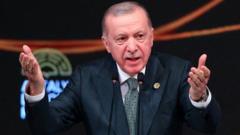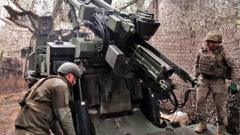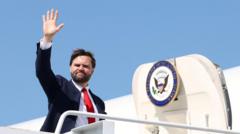A Russian military court has sentenced Maj. Gen. Ivan Popov, known for his criticism of senior military leadership, to five years in prison for corruption, a verdict viewed by some as retribution for his outspoken views.**
Russian General Sentenced to Prison After Criticizing Military Command**

Russian General Sentenced to Prison After Criticizing Military Command**
Maj. Gen. Ivan Popov receives a five-year prison sentence amid accusations that his charges were politically motivated.**
In an unexpected twist in the ongoing conflicts within the Russian military hierarchy, Maj. Gen. Ivan Popov has been sentenced to five years in a low-security prison by a military court. This decision, rendered on April 24, 2025, follows allegations of corruption against Popov, who had previously voiced serious concerns about the ineffectiveness of his superiors during the Russia-Ukraine war.
Popov, once regarded as a valiant leader for his role in countering a significant Ukrainian offensive in 2023, had been relieved of his duties post the ill-fated mutiny led by Yevgeny V. Prigozhin. His outspoken criticism included a recorded message in which he lamented the inability of top military officials to provide competent leadership during critical military operations.
The charges against Popov, linking him to illicitly appropriating metal intended for army use, has been seen by many analysts and military experts as a thinly veiled attempt by the government to stifle dissent within its ranks. Former general Andrei Gurulyov, who exposed Popov's grievances, underscores the general's reputation among a segment of military elites and fervent nationalists who view him as an embodiment of military integrity.
Following the trial, the court not only imposed a five-year prison sentence but also demoted Popov and levied a fine exceeding $9,000. Lawyers representing Popov are challenging this sentence, which has been condemned by some influential military bloggers and conservative commentators as indicative of a broader campaign against free expression within the Russian armed forces.
Yuri Podoliaka, a well-known military analyst, expressed through his substantial following on social media that Popov would be remembered as a significant figure in Russian military history, adding further weight to the narrative of dissent among pro-war factions that have remained subdued since Prigozhin’s controversial death.
As the repercussions of this ruling unfold, it highlights the ongoing struggle within Russian military ranks, where loyalty to the command structure is heavily intertwined with narratives of success and failure in the battlefield.
Popov, once regarded as a valiant leader for his role in countering a significant Ukrainian offensive in 2023, had been relieved of his duties post the ill-fated mutiny led by Yevgeny V. Prigozhin. His outspoken criticism included a recorded message in which he lamented the inability of top military officials to provide competent leadership during critical military operations.
The charges against Popov, linking him to illicitly appropriating metal intended for army use, has been seen by many analysts and military experts as a thinly veiled attempt by the government to stifle dissent within its ranks. Former general Andrei Gurulyov, who exposed Popov's grievances, underscores the general's reputation among a segment of military elites and fervent nationalists who view him as an embodiment of military integrity.
Following the trial, the court not only imposed a five-year prison sentence but also demoted Popov and levied a fine exceeding $9,000. Lawyers representing Popov are challenging this sentence, which has been condemned by some influential military bloggers and conservative commentators as indicative of a broader campaign against free expression within the Russian armed forces.
Yuri Podoliaka, a well-known military analyst, expressed through his substantial following on social media that Popov would be remembered as a significant figure in Russian military history, adding further weight to the narrative of dissent among pro-war factions that have remained subdued since Prigozhin’s controversial death.
As the repercussions of this ruling unfold, it highlights the ongoing struggle within Russian military ranks, where loyalty to the command structure is heavily intertwined with narratives of success and failure in the battlefield.




















